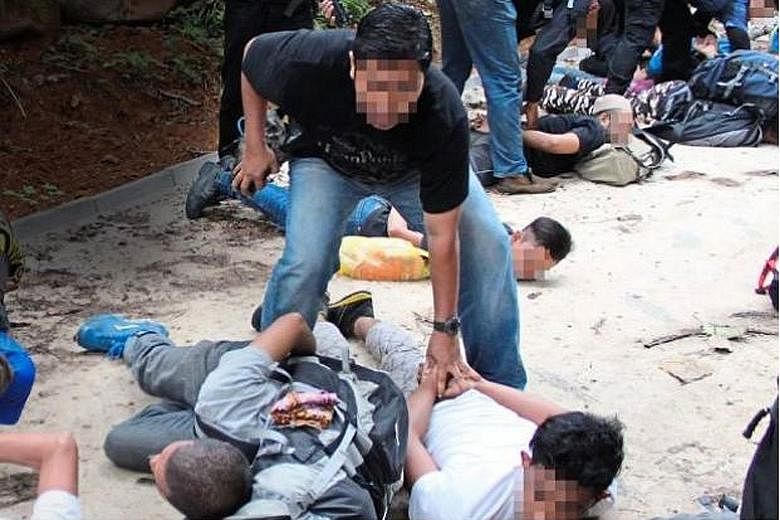JAKARTA • South-east Asia faces a multi-faceted challenge: How to intercept those returning from the battlefields of Syria and Iraq, differentiate the hardcore extremists from the misguided ones, and deal with them accordingly.
Hundreds from the region have joined the Islamic State in Iraq and Syria (ISIS), many of them inspired by the dream of creating an Islamic caliphate in South-east Asia, by force if necessary.
"We worry about returnees who come home to recruit people for terrorist activities, and motivate them to launch attacks," Datuk Ayub Khan, the Malaysian Special Branch's principal assistant director for counter-terrorism, told The Straits Times.
Malaysian and Indonesian police said ISIS returnees could potentially launch large-scale terror attacks like the 2002 Bali bombings, which were carried out by returning fighters from Afghanistan, and carry out kidnappings and assassinations.
While the majority of South-east Asia's ISIS members have remained in Iraq and Syria for now, more of them are expected to return when the war winds down. "This could be a serious problem five to 10 years down the road," Mr Ayub said.
-
ISIS RETURNEES
-
INDONESIA
• Number known to have gone to Syria: 280
• Number who have returned: 20
• Arrested: 13
• Under surveillance: Seven
MALAYSIA
• Number of ISIS-linked suspects arrested since February 2013: 111
• Number who returned from Syria: Seven
AUSTRALIA
• Number who returned from Syria: 25
• Number of returnees involved in terror activities at home: 19
• Number convicted of terrorism: Eight
Adding to the threat, Indonesia, Malaysia, Thailand and the Philippines have local Islamic militant groups, some of whom are sympathetic to ISIS and able to provide resources and cover to ISIS returnees.
On the legal front, not all governments are fully equipped to deal with the problem. Indonesia is struggling to deal with security threats posed by ISIS returnees because of the limits of its terrorism laws.
The existing Anti-Terrorism Law 15/2005, enacted in the aftermath of the Bali bombings, only covers terrorist acts committed domestically. It is difficult to prosecute ISIS suspects who committed crimes or joined a terrorist group in foreign countries. In instances where there is not enough evidence to prosecute ISIS returnees, they are kept under surveillance.
That raises an additional problem: Most Asean countries lack the staff or resources to monitor hundreds or even thousands of people deemed a security risk.
Indonesia hopes to tighten its terror laws with a draft Bill submitted to Parliament at the end of last year. But it has yet to be debated.
"In the eyes of the politicians, (ISIS) does not seem to be a problem. Otherwise, they would have given priority for this Bill to be debated. Only the police seem to think it's a serious problem," said Professor Adrianus E. Meliala, a counter-terrorism expert and member of the National Police Commission.
Last Friday, Indonesian police said they arrested three militants with links to ISIS, who were planning bomb attacks during today's independence day celebrations. It is not clear if they are returnees.
To date, 280 Indonesians are known to have gone to Syria, out of which 20 have returned home, according to Indonesian officials. Of the 20 returnees, 13 have been arrested. The remaining seven were put under surveillance.
In Malaysia, 111 ISIS-linked suspects have been arrested since February 2013. Out of the 111, seven are returnees from Syria, and all of them have been charged in court.
"Our laws cover acts and membership of terror organisations overseas, and others. I am quite comfortable with it," Mr Ayub said. Police and analysts said not all South-east Asian returnees are fighters. Many were tasked with menial jobs in Syria and Iraq. However, it was important all of them go through the due process of law.
"We need to arrest them to enable us to interrogate them, so that we can assess the psychological state of their ideology, how militant they are," said Mr Ayub.
For the non-militant returnees, police ask Muslim religious teachers to help deradicalise and rehabilitate them, he added.
Indonesia has a similar deradicalisation programme, run by the National Anti-terrorism Agency.
Singapore has formed the Religious Rehabilitation Group, which comprises Singaporean Muslim scholars who counsel terror detainees and radicalised individuals.
Some countries have taken a harder line. Australian Prime Minister Tony Abbott said disillusioned extremist fighters returning home will face arrest, prosecution and jail, with no exemptions. Speaking in June, he said 19 of the 25 Australians who have returned home were later involved in some form of terror activity, with eight convicted of terrorism offences.
Counter-terrorism expert Noor Huda Ismail, who founded the first private deradicalisation programme in Indonesia, said returnees are the best tool to counter ISIS' narrative. "They are a symbol of ISIS' broken promises. Their stories are very compelling," said Mr Huda.
He added that there is also a need for Indonesia's two largest moderate Muslim organisations, Nahdlatul Ulama and Muhammdidyah, to create a campaign to define a Muslim's identity, as part of efforts to deradicalise ISIS members.
"Being a good Muslim does not mean becoming a member of ISIS," Mr Huda said.


